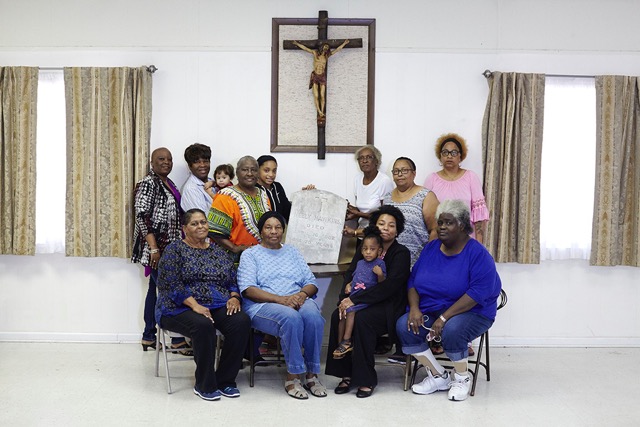Your donation will support the student journalists of Tulane University. Your contribution will allow us to purchase equipment and cover our annual website hosting costs.
Courtesy of the Georgetown Memory Project
Descendants gather in autumn on 2016 in Maringouin, LA. The descendants hold the broken gravestone of their GU272 ancestor, Cornelius Hawkins, retrieved from a nearby churchyard.
“You can’t really know your future until you know your past”
October 19, 2017
Though legacy status grants the descendants preferential consideration in the admissions process, it does not guarantee acceptance to the university, nor does it provide for financial aid. The average cost of attendance for a Georgetown undergraduate student attending the institution in the 2017-18 school year is $72,496 a year.
While Thomas wanted to attend Georgetown, she needed to raise the funds necessary to afford the tuition and fees and started a Go-Fund-Me campaign when she was notified of her acceptance.
“When they offered legacy status, I definitely decided then and there that I wanted to take the opportunity to go to Georgetown and to experience first hand where I’m from and where I have been … You can’t really know your future until you know your past,” Thomas said.
Short-Colomb pointed out, however, that not all descendants of the 272 see legacy status as particularly beneficial to them.
“So if you’re not coming to go to the School of Foreign Service or to business school or the broad-based liberal arts, Catholic university education, what actually [does Georgetown] have to offer to students from Maringouin, Louisiana?” Short-Colomb said.
The decision to offer legacy status to descendants was made by the Georgetown working group, without participation from or consideration by the descendants themselves. Cellini said he offered to connect the working group with the descendants GMP was finding, but he was turned down multiple times.
“I think at the very least, there should be a way for Georgetown to ensure that the descendants of those 272 enslaved people never have to worry about if their college education is going to be paid for, Georgetown or any other place of their choosing, because after all, it was slave labor that kept Georgetown afloat,” Harper Royal said.
With a history rooted in enslavement, monetary cost is not the only concern raised by some of those affected.
“[Some of the descendants] feel like this is an opportunity for them to right a wrong. For me to get an education from an institution that my mama couldn’t even walk across the campus with,” Carolyn Barber-Pierre, Tulane assistant vice president of student affairs and the head of Office of Multicultural Affairs said. “You know, does it show progress? Do I forget the history? No. You will never forget the history. But you can’t live in the past. You can right the wrongs, you can change the culture.”


Leave a Comment